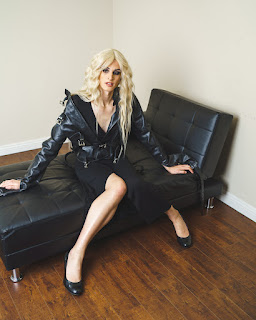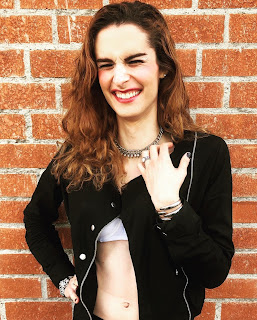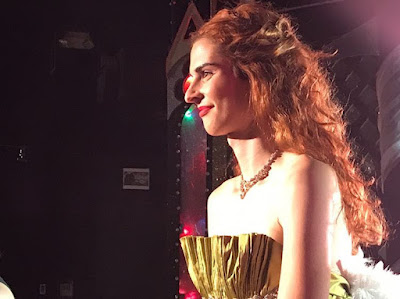Monika: Today I would like to present to you Erica Burns, an American comedian, model, and vlogger documenting her transition on YouTube. Hello Erica!
Erica: Hi Monika. Thank you so much for featuring me in your blog. It is a huge honor.
Monika: Could you say a few words about yourself?
Erica: Most definitely. I am a transgender woman living in the United States, currently in the process of fighting to complete my medical transition from male to female.
Monika: You uploaded your first video into YouTube in June 2012. What inspired you to start your vlog?
Erica: That is correct. Back then, I was inspired by female comedians like Sarah Silverman and her show, The Sarah Silverman Program, along with Chelsea Handler and her shows Chelsea Lately and After Lately. That summer between college semesters, I decided to get silly and creative and put myself out there on YouTube in a comedic fashion, hoping it would make me famous.
Monika: Do you get many questions from your followers? What do they ask for?
Erica: I do not get too many questions from my followers, but I do get comments in reference to the subject matter I discuss, which, as of late, has been largely focused on being transgender and my transition. Many have commented that I am already beautiful and do not need facial feminization surgery (FFS).
Monika: YouTube is full of transition-related topics. Which aspects of your transition might be most interesting for your viewers?
Erica: I would say the fact that I am an everyday trans woman and not one of the famous princesses out there on YouTube with the money to pay for the expensive transition-related surgeries that to this day, most insurances do not cover. I think people tend to appreciate that the most, that I say it like it is.
Monika: Why did you choose Erica for your name?
Erica: I chose Erica for my name because my old/dead name was "Eric." My transition was so delayed that by the time I actually had the ability to fully come out, the name aspect just seemed like mere practicality. I'd heard of some trans women by that point, who had just added a letter to their former male name. So rather than go to the trouble of having to pick out a name, I decided to go this same route. I was lazy about it I suppose you can say, while simultaneously downtrodden over how delayed it had been. Going from Eric to Erica felt safe and simple and I really didn't feel I had the space for much else.
Monika: We all pay the highest price for the fulfillment of our dreams to be ourselves. As a result, we lose our families, friends, jobs, and social positions. Did you pay such a high price as well? What was the hardest thing about your coming out?
Erica: I definitely did pay a price for coming out, or trying to come out, earlier than when was more acceptable and safe, as many trans people are now. I grew my hair out in high school as early as 2006 and was ridiculed as a result. I was ostracized by many of my peers, as my parents warned me I would be for growing my hair long, and I missed out on obtaining summer jobs because I feared I wouldn't be hired anywhere due to my long hair, which I would be expected to cut. It was not as easy or simple by any means as it ought to have been. It still isn't.
Monika: Was your family surprised by your transition? Did they accept it easily?
Erica: My family, aside from my parents, were rather surprised. As transgender people were virtually invisible to them, like to society as a whole due to systematic discrimination over the decades, my family always had just presumed I must have been gay, but they realize now it was always far more than that.
Monika: Are you satisfied with the effects of the hormone treatment?
Erica: I am somewhat satisfied with the effects of hormone treatment, but it has still unfortunately not been enough to prevent me from needing procedures and surgeries done, many of which initially weren't covered by insurance and some of which still aren't. Therefore, I am still in a very disjointed time of trying to obtain access to my final transition surgery, that being facial feminization surgery (FFS). Sadly, my state Medicaid insurance still deems it "cosmetic" and I am currently working with lawyers against my insurance as a result of this.
 |
| "I definitely did pay a price for coming out." |
Erica: This is very much in line with my response to the previous. Because I still have not been able to have FFS, I am more of a prisoner to not passing as a result. I do have the fortune of passing to many anyway, but in the meantime, fighting against the adversity I am currently facing (no pun intended) and simply existing around cisgender people in my everyday life, while refusing to minimize myself and my lived experiences, are ways that I personally am able to cope. I find fulfillment in the fight alone. I hope others can as well.
Monika: Do you remember the first time you saw a transgender woman on TV or met anyone transgender in person?
Erica: Yes, I do. I remember seeing a special on Discovery Health when I was in seventh grade about a transgender woman named Michaela, who had parents with the very same names as my own parents. I took that as a sign for sure. That was when I realized I was also transgender if I hadn't realized already.
Monika: Are there any transgender role models that you follow or followed?
Erica: I honestly don't. It's not that I don't appreciate them, but the truth is many of those role models are rich and famous and are not accurate representations of the transgender community as a whole. I am an everyday transgender woman and not a Hollywood or YouTube superstar. Perhaps I am just bitter because I never made it in Hollywood really. Not yet at least. I don't even live in LA anymore. Anyway, I appreciate those who have helped to pave the way, but at the end of the day, there is still so much pioneering to be done.
I will say that when I was a teen, I would read the stories of transgender women on their personal websites. One that particularly stuck out to me and blew me away was that of Jennifer Diane Reitz. It was a raw account of what one transgender woman had to do to survive in the early 1980s. Reading her account on my parents' computer in secrecy at fifteen, I was simultaneously horrified and awe-inspired.
Monika: What do you think about the present situation of transgender women in your country?
Erica: Currently, I think the present situation of transgender women in my country is still rather embarrassing. We are still fetishized by men and are even expected to be hypersexual. The fact that I have even been considering resorting to sex work to survive... well, that may also be due to the rich getting richer and the poor getting poorer, but ultimately, it goes to show that the present situation for everyday trans women like me is still not a just one. If it was, I would have a substantial enough career by this point, whether that be in Hollywood or elsewhere. This is the reality of the present situation, whether the Hollywood elite transwomen such as Laverne Cox, Caitlyn Jenner, Gigi Gorgeous, Kim Petras, etc. want to admit it or not.
Monika: Do you like fashion? What kind of outfits do you usually wear? Any special fashion designs, colors, or trends?
Erica: I do like fashion, yes. I don't always dress super fancy or glam, but when it is time to get dressed up, I know how to do it right. I appreciate purple nail polish and also trans-colored nail polish (blue, pink, and white). I can be as casual as wearing a nice top and jeans to being more dressed up with a fancy dress and heels. Not that I need a heel, tall as I am, but for when the time is right.
Monika: Do you often experiment with your makeup?
Erica: Yes, I do. Lately, I have been using purple eyeshadow around my eyes, along with a highlighter between my eyes and brows and pink blush on my cheeks. I am fine with just a simple lip color on my lips, almost like chapstick, but with a little extra gloss and shine.
Monika: By the way, do you like being complimented on your looks?
Erica: I do, yes. While I know that looks aren't everything, it is a nice feeling to know I am attractive to many and can be a hot young woman. Especially since I didn't get to be the hot girl in my teens or early twenties.
Monika: Do you remember your first job interview as a woman?
Erica: I do. I was presenting as Erica but was still very early on in my transition. I hadn't even started hormones yet. So the manager of the Chipotle asked me if, for everyone's convenience there, I could present as "Eric," my old/dead name. I told him no, that I was not comfortable with that. I ended up working for another Chipotle anyway, where the managers did not ask me to compromise myself like that, even though I had not yet legally changed my name. Perhaps it was due to the fact that this Chipotle I ended up working at was in a less conservative area. It worked out for the better in the end.
Monika: What would you advise to all transwomen looking for employment?
Erica: I would advise them not to compromise themselves for any employer. Another job I had while I was still early on in my transition also asked me if I could present as "Eric." I was working with kids and my employers were worried about what the parents would think about me presenting as "Erica" when I still looked a lot like a 22-year-old guy, physically speaking. This wasn't fair to me or to my mental health and well-being. There is more acceptance and understanding now, but it doesn't change the fact that this took a toll on my ability to have to continue hiding a part of myself and depending on alcohol at times to make it not seem so bad.
 |
| "I don't always dress super fancy or glam, but when it is time to get dressed up, I know how to do it right." |
Erica: Yes, I am involved in my local LGBTQ community. As I mentioned before, I am working with two fellow transgender lawyers, along with a number of other trans individuals with legal and political backgrounds, to advocate for more generous coverage of transgender procedures under my state's insurance. At this time, the main two focuses being FFS and electrolysis.
Monika: Could you tell me about the importance of love in your life?
Erica: Yes. I actually am in love right now and I think it is honestly the most wonderful thing in the world. As a trans woman, it has been very difficult for me to find this, and the fact that I have found it is completely surprising to me. l did find out recently, however, that he has not yet told his family I am trans. They met me in person over Christmas so they may already know (he said his sister found me on Instagram), but this is something I am going to have to talk to him about. I want to make sure I am not going to be expected to hide this significant part of myself. I really hope not because I love him, he loves me, and I am the happiest with him that I have been in a long time. Maybe ever.
Monika: Many transgender ladies write their memoirs. Have you ever thought about writing such a book yourself?
Erica: I actually have written a memoir about the first nineteen and a half years of my life. I intend to publish it. I am aiming for this year's National Coming Out Day, being October 11, 2022. If not this year, then definitely on one of the National Coming Out Days in the years to come. It is ready to go when the time is divinely right.
Monika: What is your next step in the present time and where do you see yourself within the next 5-7 years?
Erica: In the present time, my next step is to hopefully continue developing my relationship with my boyfriend, assuming that, God willing, I am not expected to be that dirty little secret. I can definitely keep you posted and I know that even in the worst case scenario, I will find a way to survive, as I have for all of these years.
In addition to this, I continue to narrate audiobooks for a really awesome company that pays me well and meets me where I am. I also am working on growing in a customer service rep job, where I take calls for providers and recipients of Maryland Medicaid, in the behavioral health sector. It may not sound very exciting and honestly, it does feel quite minimizing, but it's a paycheck, it's relatable in having dealt with mental health and substance abuse issues myself over the years (two plus years alcohol sober), and I do believe things happen for a reason.
I have been actually pursuing a case with fellow transgender lawyers against Maryland Medicaid, for not covering my final transition surgery and deeming it cosmetic: that surgery being facial feminization surgery (FFS). So my goal remains to face my trauma, pun totally intended, in my home state, while working with the very insurance I am up against. Isn't it ironic? Yeah, I really do think.
In the next 5-7 years, it's hard to know. I really am convinced that we are living out the book of Revelations now, per the Bible, and these are End Times. That said, I know I still have a lot to live for and do so that when and if the end does come soon, I can be covered in glory for having lived out my Last Days to the best of my ability.
 |
| "We deserve more than to just survive. We deserve to thrive." |
Erica: I would tell them that living in fear is not worth it and that the more of us who make the brave choice to do it, the more momentum we will gain in working to create a less hateful and more loving world. It's hard, though, with insurance not covering a lot of surgeries, but we can stand together and fight and by the end, we can all be covered in glory for the brave, honest souls that we are.
Monika: My pen friend Gina Grahame wrote to me once that we should not limit our potential because of how we were born or by what we see other transgender people doing. Our dreams should not end on an operating table; that’s where they begin. Do you agree with this?
Erica: I absolutely agree with this. While I am not fully transitioned, I have had gender reassignment surgery and not having to worry about what is between my legs any longer, not having that hanging over me, is a wonderful thing. I can go to the beach or pool and wear a normal bikini. I can be intimate with my boyfriend (who I'll hopefully continue to have) and it feels right because I love myself and what I now have down there, which allows me to love him. It's the greatest thing and this has come after surgery. I wish surgeries, and the one I still have left, had been sooner, but I hope I can still find a way to make up for the lost time.
Monika: Erica, it was a pleasure to interview you. Thanks a lot!
Erica: Thank you so much, Monika, for taking the time to reach out to me and interview me! I really appreciate it and all you are doing to help us, trans people. We deserve more than to just survive. We deserve to thrive.
All the photos: courtesy of Erica Burns.
© 2022 - Monika Kowalska




I thoroughly enjoyed reading your blog. Your honesty is commendable. I sincerely hope that you get all that you deserve in this life as a Transwoman.
ReplyDelete